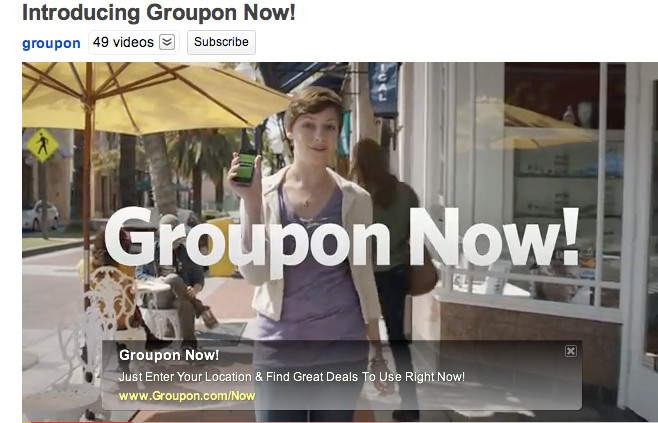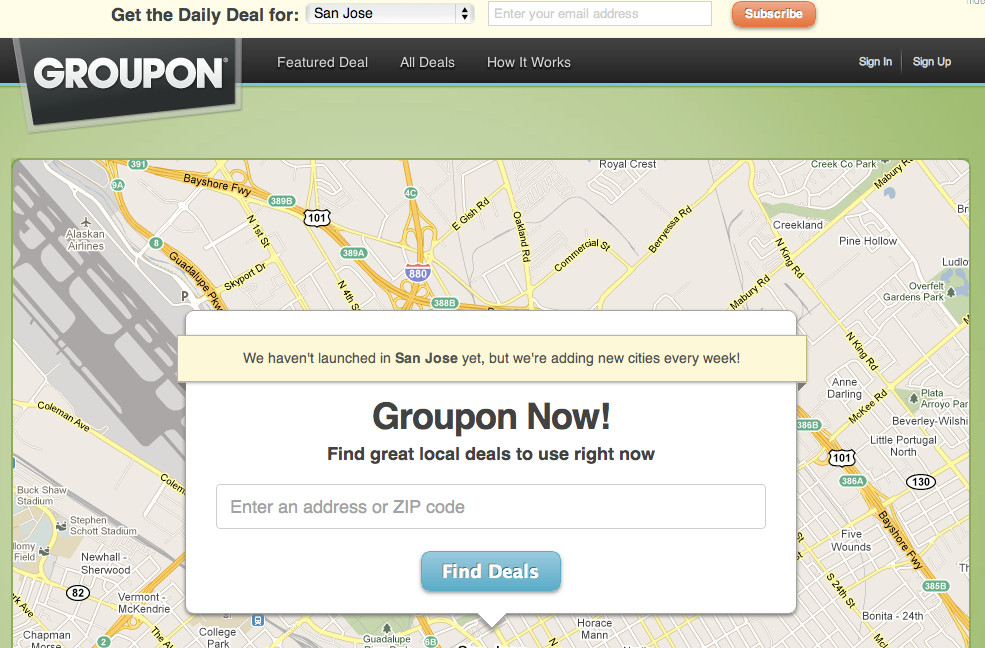How to compete with GrouponNow
Groupon's newest initiative, GrouponNow, is already being sold in a few large markets and spreading across the country. What is it and how to compete?
In brief, GrouponNow is a locational, mobile-based gift certificate store, in which consumers can find hundreds of nearby deals from local merchants and purchase them on their phone. The first two buttons ask users to simply choose between "I'm bored" and "I'm hungry." Check out the video here.
Merchants create and control their own deals via a dashboard, and either use their own e-mail list or pay to use Groupon's list. Like regular Groupon, the service is being sold via telemarketers.
Fees to merchants
The discounts on GrouponNow are not as deep as a traditional 50% to 80% off Groupon deal, and though Groupon says it charges 50% it is currently approaching merchants in San Francisco with an offer to take just 25% of the deal. The revenue share is more competitive in this space; other mobile coupon sites charge much less or simple low flat fee.
(In fact, Groupon's value proposition - the super huge e-mail list - is out of sync with this product. We aren't sure how local merchants can buy slices of Groupon's e-mail list, as promoted, without creating spam. Also we wonder if Groupon will acquire an merchant e-mail list that is input into their system, so as to Groupon would be spamming merchant's customers with daily deals from other merchants. It's not clear as yet, but we'll update how this works as we investigate.)
Value proposition
Because the deals are on-going, they can be used like SMS to create same day, instant sales for dining or entertainment, hence the name "GrouponNow."
Here's Mashable's take:
The familiar $10 coupons for $20 worth of food are still there, but they’re not one-time offers. Instead, businesses can choose when they want these deals to be available. Say a restaurant is incredibly busy on Saturdays but could use more business on Wednesdays. With Groupon Now, that business can fill its seats during slow business days using time-specific deals.
That’s the beauty of Groupon Now: Local businesses have never really had a simple way to manage their perishable inventory, especially labor and food. Why waste those resources during slow periods when you can bring savings-savvy consumers through the doors with a highly targeted GrouponNow deals.
Markets
First markets to launch will be top ten, ie Chicago and San Francisco, which are highly competitive. Telemarketing efforts are already underway.
Competition
In these top markets, there are already locational coupon products (not certificates) that compete with GrouponNow, both with and without media partners. Pureplay ScoutMob is already strong in San Francisco and fully locational; it charges a flat $3 per coupon "redeemed."
Our recommendation to compete immediately for the space is a partnership with Forkfly's locational, mobile coupon platform, which is free to media partners and exclusive by DMA (the rev share is from its "SuperFly" daily deal, which can be calculated separately from your current deal partner if neccesary). Forkfly has robust social network capability and a built in customer loyalty program with push phone notification (not SMS) for Android and iPhone.
Their recommended merchant charge is a low monthly fee of around $100 a month, and includes not just push to Facebook and Twitter, but also to customers who have favorited the business via phone and e-mail. Customers "activate" coupons and have two hours to make a purchase; so there is a built in tracking mechanism. Other competitve advantages besides the flat fee, include added value from media partners promoting offers, and up to four deals at a time.
Businesses planning to rely heavily on pushing deals, or which have high ROI's are incented to select the low flat fee, rather than giving away even 25% of the business to GrouponNow. Superfly deals also allow a "type in" - but not barcode swipe - so merchants can handle redemptions via phone for its daily deals. "SuperFly," with a barcode swipe is on the road map.
On the other hand, solving the redemption problem via a smart phone app that scans bar codes is slick; the store clerks do not have to ring anything up. Nice for the consumer. Other certificate stores that partner with media companies, such as AltPerks are working towards the same kind of mobile solution.
SMS programs almost look clunky in comparison, except for phones that aren't "smart," which are still significant in a number of markets.
Advantage local media
The main advantage local media have in most markets are the outside sales teams with merchant relationships, being first to market, and the ability to leverage high traffic web sites and other media assets, such as radio, print and broadcast.
Additionally, Groupon 1.0's model of deep discounts and high revenue share was based on the ability to supply massive promotion through the e-mail list. GrouponNow does not offer this, or the extreme discount brand it made famous.
Hence there is little justification for even a 25% - much less 50% - rev share, except for the cool technology, which can be replicated, and the national branding, which only works on a first-to-market basis. Note to local media: Be first to market.
Helping fuel Groupon's evolutionary drive is competition from LivingSocial, which is poised to overtake Groupon in the extreme discount space this year.
In small markets, another key threat to both local media and GrouponNow in the next six months is Googleoffers; deploying Googlewallet in all Android phones. For smaller publishers, again, the key takeaway is to get there first, and provide more value.
Here's our recommendations for local media companies to compete:
a. Don't cede your DMA to GrouponNow (or GoogleOffers) in the locational deal store/coupon space
The locational coupon and certificate store space is still up for grabs. Forkfly, can, at least conceivably, be launched in 30 days, because most of the technology is already built. It also has a nascent national network, which is better than launching alone.
As a brief round up of the other options: Altperks is moving in this direction, and daily deal providers have this on the roadmap. HipCricket is SMS-based but similar, and RadarFrog is close but deep into development issues created by a partnership with Gatehouse media. BriteCove claims to be able to build-to-suit quickly, but fast to market may mean choosing something further along.
This is not an exhaustive list, just what we have come across in our travels, so if anyone has another option please comment, or respond to alisacromer@gmail.com.
A key decision is whether to start with your certificate provider, and works towards adding a mobile, locational plan. Or start with simple locational coupons, and launch quickly. Our recommendation is to talk to your Daily Deal provider first, to see where this ability is on the road map. Speed to market is key, and the window may be as short as six months in small markets and two, in larger ones.
(Some vendors protest that mixing up the two is a bad idea; Forkfly has social/mobile coupons and a daily deal called "SuperFly" built in. Will consumers get confused?)
b. Leverage the sales force, hire a dedicated rep, add telemarketers
Especially in competitive markets, the race is to the swift. Consumers will likely max out with only a few deal providers who push phone notifications. And merchants who build loyalty programs on one service will not be inclined to switch. So this is a key area for building out a savvy team of telemarketers to handle both sales and on-boarding issues.
c. Look at dollars per DMA, not just upsells to current advertisers
Justifying these programs to top management means buying into the much larger potential in the market than the current set of advertisers. Locational coupons with merchant controlled deals allow hundreds of merchants and even more deals, to launch quickly (that is within a couple of months), not just all resources powering one huge deal a day.
Even flat fee revenues add up: 200 merchants controling 600 deals in a market can provide a great service and power $20,000 a month even at a low, $100 per month fee, in sales to non-advertisers.
d. Leverage media assets
Best practice is to include some kind of media buy with dollars attached for every new merchant. There are a number of ways to do this: Launch ads carry merchant logos; post-launch house ads feature "picks of the week" plus ads that merchants can buy into if they have a great deal. GrouponNow does not have this ability.
e. Develop merchant on-boarding strategies
Train merchants in best practices, such as "what is a good deal," and how to use great deals to acquire customer data. Forkfly allows requests for "Favoriting" a business to be part of the headline or restrictions on significant deals, for example, allowing the merchant to immediately acquire push notification capability from its customers. They need to be educated about sending just good deals, and just once a week.
f. A long-term commitment, not just a launch
Like so many of these business models, the launch strategy may be a sprint, especially in markets that have GrouponNow already on the phones; but the long term strategy is a marathon. If there are "too many" products for the current sales team, maybe it's time to consider branching out into digital only staff that can handle significant new initiatives.
Feedback appreciated, please comment below or send to alisacromer@gmail.com









